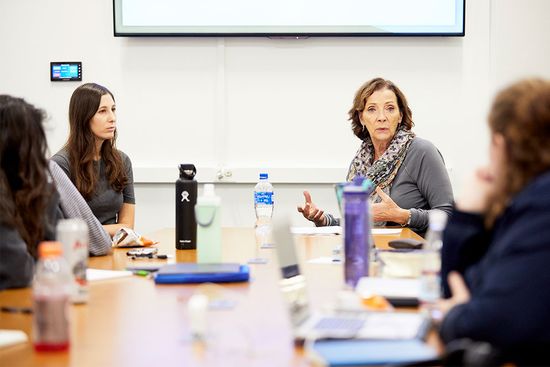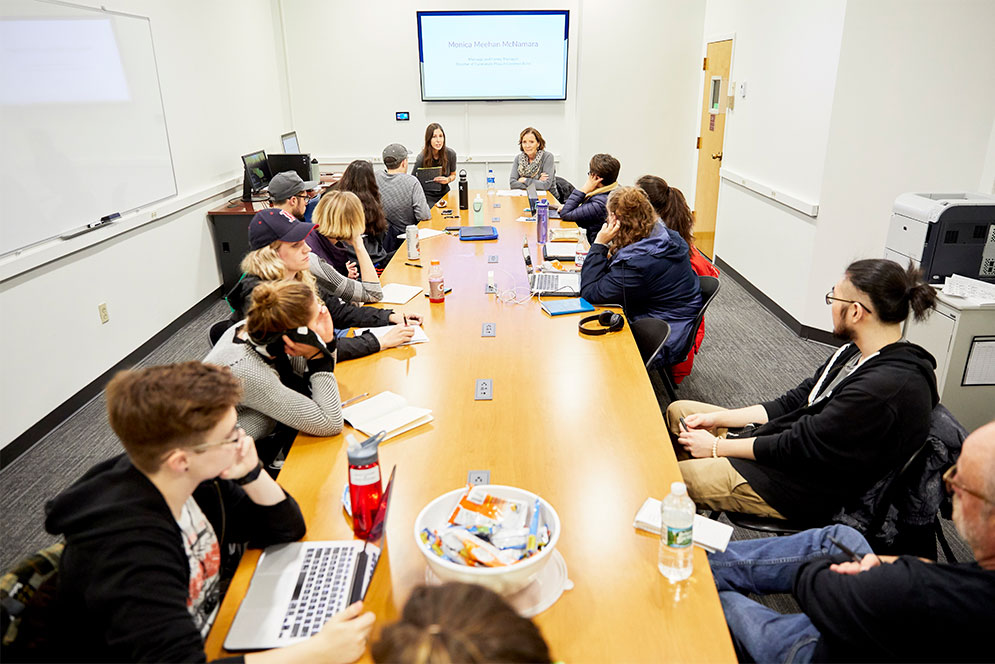COM Students Learn How to Report the Most Difficult Stories
New Trauma Journalism class also teaches writers how to care for themselves
Sarah Kess was a student at an all-girls high school in Ohio when the two planes flew into the World Trade Center towers on September 11, 2001.
“Most of the girls were crying and trying to call home, and I just instinctively took a notebook out and was going up to people asking them where they were when they heard the news and what they were thinking,” says Kess (COM’12). “I had never considered journalism, it just felt like what I wanted to do in that moment. And it planted a seed of being interested in—how do we tell the story well, how do we tell it right, when these traumatic events happen?”
Flash forward 17 years. Kess is the College of Communication journalism department administrator and assistant director of its annual Power of Narrative conference. And this fall she started teaching Trauma Journalism, a new class where journalism majors learn how to cover the most difficult stories—from school shootings to sexual abuse cases, tsunamis to famines—and how to live with what they’ve seen and heard. At least in the popular imagination, journalists aren’t always sensitive to survivors of trauma, nor do they always deal with what they’ve witnessed themselves in healthy ways. This class aims to change that.

Among the speakers invited to address the class was marriage and family therapist Monica Meehan McNamara, director of curriculum at Project Common Bond, which brings together young adults from around the world who have lost a family member to terrorism, violent extremism, or war. McNamara shared insights with the students about interviewing children and teenagers who have experienced or witnessed trauma. Start by interviewing children at eye level, she suggested, so you don’t appear intimidating. Connect with them as people: “Make them feel as though their life is not just this one story.”
Trauma affects young people differently than adults, she told the students. “They haven’t developed coping strategies. When the worst thing happens, it tears that sense of safety away from them.” Children who live in places where jeopardy is constant—Northern Ireland during the Troubles or Palestine and Yemen today—are often hypervigilant, “just waiting for the next thing to happen.”
Too often, McNamara noted, reporters who come to do stories on Project Common Bond have tried to isolate one of the youth and drill down into their story, asking them to relive the worst moments of their lives. “It’s really upsetting,” she said. As a result, the organization now tends to offer only press conferences, so students are together when talking to the press.
But it can be beneficial, even empowering, for young people to talk about what they’ve been through, McNamara said. They gain control of their narrative and can talk about issues that matter to them—a prime example: the teenage survivors of the 2018 Parkland, Fla., school shooting, who have coped with that terrifying tragedy by making a big impact on the national debate about guns.
Deadlines are tough. Reporting can be tougher
There’s more than a kernel of truth in the cliché of hard-bitten reporters asking grieving family members, “How do you feel?”—then drowning their feelings in alcohol once they’ve filed the story. No one used to worry much about the state of mind of reporters, but the profession is under attack nationally, heckled by President Trump at rallies and from his Twitter account (FAKE NEWS! SAD!). And amid all that, violence against journalists is on the rise—just this past June, a gunman entered a newsroom in Maryland and murdered five employees.
People are starting to ask reporters how they feel. And the industry has begun to change how it trains its workers.
Kess worked for her high school newspaper, earned a bachelor’s in history from St. Mary’s College, then came to BU for a master’s in journalism. From 2012 to 2014 she worked for Ochberg Society for Trauma Journalism, which is connected to Columbia University’s Dart Center for Journalism and Trauma and offers fellowships to senior and mid-career journalists who want to “deepen their knowledge of emotional trauma and psychological injury, and improve reporting on violence, conflict, and tragedy.” As managing editor for Ochberg publications, she worked with, and wrote about, fellows who had reported on some of the most disturbing stories, from school shootings to mass molestation scandals to the war in Afghanistan.
Many of them had insights on dealing with those situations ethically and empathetically, she says, and “the number one thing I would hear from these journalists was, ‘I wish I had learned this at the beginning of my career. I wish these were skills I had been taught in school.’”
Kess returned to BU in 2015 to work at COM. “I talk to a lot of students through the year, and they will sometimes talk to me about certain stories that were difficult for them or certain stories that they had a hard time decompressing from,” she says. “They don’t know how to handle certain situations that are especially sensitive. And that was really my background.” She starting thinking about a class that would teach them some of those skills.
“I thought it was a brilliant idea,” says William McKeen, a COM professor and chair of journalism.
He recounts bringing in Pulitzer-winning Boston Globe photographer Jessica Rinaldi (COM’01) to one of his graduate classes last year, where she talked about the emotionally draining task of reporting on families devastated by opiate addiction and poverty. “Students asked her, ‘What did you do to take care of yourself?’ And she had the standard journalistic response, which was: ‘I went back to work,’” he says. “That showed me that this generation is smarter. They’re concerned not only with information and democracy dying in darkness and all that stuff, but they’re also concerned with managing this. We ought to take better care of ourselves.”
The Trauma Journalism class, which Kess will teach again next fall, has included visits from sexual assault survivors who talked about going public, psychology staffers from a local VA facility who discussed post-traumatic stress disorder, and former Globe reporter Eric Moskowitz (now at the New York Times), who spoke about his stories on the aftermath of the Boston Marathon bombings. But there has also been time spent on meditation, yoga, and other self-care methods for reducing the stress of difficult stories.
“That’s a really, really important part of this course,” Kess says. “Journalists are first responders, but unlike police, unlike firefighters, unlike EMTs, who are all trained to decompress and talk to someone after a traumatic event, journalists on the whole are not quick to recognize the psychological implications of the work they’re doing.”
That may be especially true for reporters at the beginning of their career, and especially women, who feel the need to prove themselves and their toughness to their editors and other bosses, she says.
The lessons are hitting home for at least some of the 13 students in the class.
“I took this class because a few days after a mass shooting last spring—and it hurts that I can’t remember which one—an email popped into my inbox from BU, saying that they were going to start a Trauma Journalism class,” says Natasha Mascarenhas (COM’19). “We’d learn how to cover tragedy ethically and responsibly. Feeling so emotional from the whole year, I immediately emailed Sarah about it and found a slot for the fall semester.”
Mascarenhas says she and her classmates have been surprised by how much focus the class has placed on journalists’ mental health. “It’s something you don’t get in COM 101, and as a young journo, something you don’t really know you need,” she says. “We learn how to breathe better, and it makes us do our job better. Remembering we are a part of our stories has been the biggest skill I learned.”
The bright side of the issue, Kess says, is that “journalists tend to be an incredibly resilient group because of the meaning they attach to their work. They tend to feel, ‘I have a purpose, there is a reason why I’m doing this,’ and that really helps their resilience levels.”




Comments & Discussion
Boston University moderates comments to facilitate an informed, substantive, civil conversation. Abusive, profane, self-promotional, misleading, incoherent or off-topic comments will be rejected. Moderators are staffed during regular business hours (EST) and can only accept comments written in English. Statistics or facts must include a citation or a link to the citation.